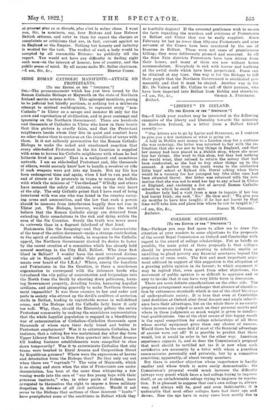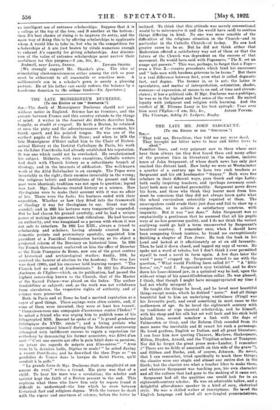COLLEGE SCHOLARSHIPS. [To THE Burros or THE " SPECTATOR."]
Snt,—Perhaps you may find space to allow me to draw the attention of your readers to some objections to the proposals of the recent Royal Commission on Oxford and Cambridge with regard to the award of college scholarships. Put as briefly as possible, the main point of those proposals is that colleges should be prevented from granting to scholars unable or unwilling to plead poverty any financial assistance beyond the remission of room rents. The first and most important argu- ment adduced in support of this suggestion is the allegation of a growing public opinion in its favour; to which argument it may be replied that, even apart from other objections, the movement of public opinion is so difficult to appraise and so easy to invoke that it can have very little force in discussion.
There are more definite considerations on the other side. The proposed arrangement would endanger that absence of classifica- tion by extraneous standards which is one of the chief blessings of undergraduate society. It is true that even at Cambridge (and doubtless at Oxford also) ducal descent and ample inherit- ance have their advantages, but on the whole there is no society where persons are judged so much on their personal merits and where in those judgments so much weight is given to intellec- tual qualifications. One of the chief causes of this happy result is the equal competition for college scholarships of all those whose mental equipment gives them any chance of success. Would there be the same field if most of the financial advantage of success were cut off? It is possible to predict that there would, but it would be safer to bet the other way. American experience suggests it, and so does the Commission's .proposal that need should be certified not (as it is now when such certificates are necessary) by a tutor with whom a guardian communicates personally and privately, but by a committee consisting, apparently, aaf about twenty members.
But there is another objection whose importance is hardly smaller and whose truth is more easily demonstrable : the Commission's proposal would much increase the 'difficulty (always very great) which faces a bad college trying to improve itself, or an unfashionable college trying to improve its repute,. tion. It is pleasant to suppose that one's own college is, always was, and always will be, good and •even fashionable; it is undeniable that most other colleges have had their ups and downs. 'Now the ups have in many cases been mostly due to an intelligent use of entrance scholarships. Suppose that A is a college at the top of the tree, and -B another at the bottom : then B's best chalice of rising is to improve its entry, and the main way of doing this is by offering scholarships to applicants whom A would like to take in,fbut who in the competition for scholarships at A are just beaten by rivals numerous enough to exhaust A's capacity for giving scholarships. Any diminu- tion of the value of entrance scholarships must narrow their usefulness for this purpose.—I am, Sir, &c., lWe strongly support Mr. Shanks's plea. The idea of stimulating class-consciousness either among the rich or poor must be abhorrent to all reasonable or sensitive men. A millionaire's son in a scholar's gown is surely a pleasing picture. He of his father can easily redress the balance by a handsome donation to the college funds.—ED. Spectator.]



































 Previous page
Previous page